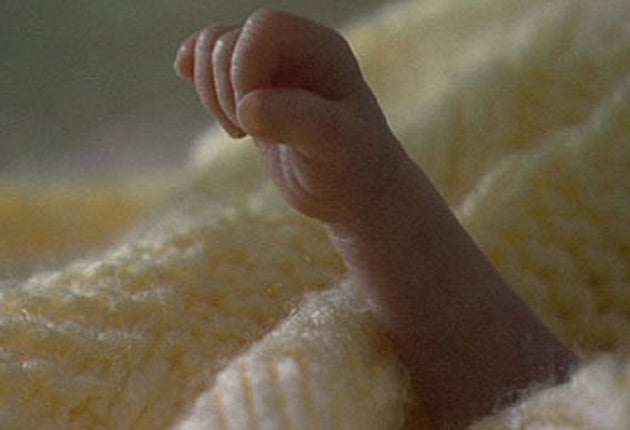Last Night's TV: 23 Week Babies: the Price of Life/BBC2<br />Great British Food Revival/BBC2

Here's an unsettling Venn diagram. One circle encloses the set of foetuses that may, within the current law, be terminated. The other circle encloses the set of premature babies that, within current technology, can successfully be kept alive. And in the intersection – somewhere between week 23 and week 24 of a pregnancy – lie those babies that qualify both as abortable and savable – the subject of Adam Wishart's challenging film 23 Week Babies: the Price of Life. Until relatively recently this intersection didn't exist at all, since doctors weren't able to keep such early births alive. And even now the overlap is very small indeed: only nine out every 100 such births survive to leave hospital and of those another six will be moderately or severely disabled. What doctors have been getting better at, it seems, is stretching out the process for those that eventually die. Where it used to happen in a matter of days, they can now be in intensive care for weeks before the end finally comes.
The phrase actually used in the research paper that established that fact was "endure", a clinical euphemism uncomfortably coloured with a sense of torment. And that was one of Wishart's points, in a documentary that made it clear from the opening seconds that it wasn't going to dodge any hard questions. "Is it worth trying to keep these babies alive?" he'd asked at the beginning, an enquiry that sounded a lot less brutal after he'd explored some of the moral grey areas thrown up by clinical advance. From the perspective of a hopeful mother – or from the perspective of a sentimental onlooker – it looks clear-cut. Do whatever it takes to keep the miracle babies alive. From the perspective of those who do the work of keeping them alive it was a bit more complex. One doctor – visibly wary about even making the argument at all – suggested that the money spent on these intensive and often fruitless treatments might be better spent on less glamorous but genuinely life-changing procedures.
The cases Wishart followed raised even more questions. Kelly, who had just given birth to Simone, already had four children and her partner, Steve, had another five by other women (premature birth rates are much higher among the poor and undereducated). Neither seemed to grasp the complexity of the options that doctors, under the current protocols, are obliged to offer them. "I ain't turning no machine off," said Steve resolutely, though he hadn't actually been asked to, only to accept that there might come a point at which resuscitation was pointless. Another couple, whose daughter was born with skin so thin and gelatinous that they couldn't touch her without leaving bruises, were far more thoughtful about their decisions, but seemed at one point to suggest that they'd been led to swap a short, sharp grief for a lifelong one. The story of the monkey's paw came to mind, a blameless and loving instinct that ends in sorrow.
The medical staff – obliged to hand over this decision to parents – weren't in much doubt themselves about what they would do in the same position. They would not, they suggested, strive to keep alive. The most telling contribution came from a neo-natal nurse whose own daughter is severely disabled after being born at 26 weeks old. "I don't think we've actually sat down and said 'was it the right decision?' because I don't think any of us wants to know what the other person thinks," she said. She clearly loved her daughter, but feared she'd given her a life that was very hard to live with. Her daughter – just as fearful about her own future as a disabled adult – devastatingly characterised the discrepancy between the spending on this extreme branch of neo-natal care and what happens to such children when they reach 18, as she had recently done: "We kept you alive... now you're costing us too much money so we're not going to bother. I'm sorry, but if you're willing to support someone at the beginning of life you should be willing to support them to the end." Wishart agreed, but he also pressed the question of whether the support at the beginning of life really deserved to be called support at all, rather than a well-intentioned kind of cruelty.
Great British Food Revival is very depressing – not because there's anything inherently wrong with trying to boost the consumption and appreciation of traditional British produce – but because the programmes that do it appear to be batch-produced in a factory. If these films were a loaf, they'd be much more like a Chorleywood white-sliced than the artisan baked sourdough that Michel Roux Jr was rhapsodising about last night. Ersatz passion is the most obvious additive. "I am passionate about bread!" exclaimed Roux, something he repeated, in paraphrase, about every three minutes, and, just in case we'd missed the point, said again at the end. "I've been on an incredible journey and I've met some passionate people... people who are as passionate about bread as I am passionate about food." The Hairy Bikers were reading from an identical script, in their hymn to an unfashionable British brassica. "This is a lady who's as passionate about cauliflower as we are," they said, introducing one of their talking heads. And the closing thought? "I think on this journey I've found that I'm even more passionate than ever about cauliflower." I might buy a cauli. Some of the recipes looked tasty. But I passionately wish they'd ditch the artificial enhancers.
t.sutcliffe@independent.co.uk
Join our commenting forum
Join thought-provoking conversations, follow other Independent readers and see their replies
Comments